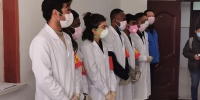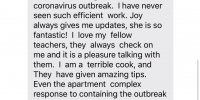Suggestions on NCP Prevention For the Public
What is a “novel” coronavirus?
A novel coronavirus (CoV) is a new strain of coronavirus that has not been previously identified in humans. The new, or “novel” coronavirus, now called 2019-nCoV, had not previously detected before the outbreak was reported in Wuhan, China in December 2019.
How dangerous is it?
As with other respiratory illnesses, infection with 2019-nCoV can cause mild symptoms including a runny nose, sore throat, cough, and fever. It can be more severe for some persons and can lead to pneumonia or breathing difficulties. More rarely, the disease can be fatal. Older people, and people with pre-existing medical conditions (such as, diabetes and heart disease) appear to be more vulnerable to becoming severely ill with the virus.
How 2019-nCoV spreads
Much is unknown about how 2019-nCoV, a new coronavirus, spreads. Current knowledge is largely based on what is known about similar coronaviruses. Coronaviruses are a large family of viruses that are common in many different species of animals, including camels, cattle, cats, and bats. Rarely, animal coronaviruses can infect people and then spread between people such as with MERS, SARS, and now with 2019-nCoV.
Most often, spread from person-to-person happens among close contacts (about 6 feet). Person-to-person spread is thought to occur mainly via respiratory droplets produced when an infected person coughs or sneezes, similar to how influenza and other respiratory pathogens spread. These droplets can land in the mouths or noses of people who are nearby or possibly be inhaled into the lungs. It's currently unclear if a person can get 2019-nCoV by touching a surface or object that has the virus on it and then touching their own mouth, nose, or possibly their eyes.
Typically, with most respiratory viruses, people are thought to be most contagious when they are most symptomatic (the sickest).
It's important to note that how easily a virus spreads person-to-person can vary. Some viruses are highly contagious (like measles), while other viruses are less so. There is much more to learn about the transmissibility, severity, and other features associated with 2019-nCoV and investigations are ongoing.
Symptoms
For confirmed 2019-nCoV infections, reported illnesses have ranged from people with little to no symptoms to people being severely ill and dying. Symptoms can include:
• Fever
• Cough
• Shortness of breath
Prevention
The best way to prevent infection is to avoid being exposed to this virus.
• Wash your hands often with soap and water for at least 20 seconds, especially after going to the bathroom; before eating; and after blowing your nose, coughing, or sneezing.
• If soap and water are not readily available, use an alcohol-based hand sanitizer with at least 60% alcohol. Always wash hands with soap and water if hands are visibly dirty.
• Avoid touching your eyes, nose, and mouth with unwashed hands.
• Avoid close contact with people who are sick.
• Stay home when you are sick.
• Cover your cough or sneeze with a tissue, then throw the tissue in the trash.
• Clean and disinfect frequently touched objects and surfaces using a regular household cleaning spray or wipe.
Treatment
If you think you may have 2019-nCoV infection, you should follow the steps below:
• Don't go to crowded areas.
• Wear a face mask and separate yourself from other people in your home.
• Keep good hygiene and air the room.
• Seek medical attention at the designated hospital and tell doctors on your recent contacts.
How to keep yourself safe from NCP (novel coronavirus pneumonia)?
To prevent catching the infection, here's what you can do:
1. Wear face masks outdoors
• Wearing a mask is one of the most effective ways to protect you from getting infected as the virus is predominantly spread in droplets.
• Make sure to wear it properly by tightening up the nose clip and pulling the bottom of it over your chin so that your nose and mouth are both covered.
• If you're not feeling well or have symptoms such as cough, fever, fatigue and trouble breathing, a mask is also needed to prevent you from spreading viruses to others.
• Surgical masks used by medical workers are not recommended for common people as they may lead to oxygen deficient if worn for long periods.
2. Cover your coughs and sneezes with tissue
Cover your mouth and nose with a tissue when you cough or sneeze, or you can cough or sneeze into your sleeve, but avoid covering with your hands directly.
(A healthy adult can release around 300,000 microbes including bacteria and viruses when coughing or sneezing.)
3. Wash your hands frequently and properly
Wash your hands with soap and running water thoroughly for at least 15 seconds, especially:
• Before eating and after using the toilet
• After returning home
• After touching trash or garbage
• After contacting with animals or handling animal wastes
4. Strengthen your immune system and exercise regularly
• Exercise regularly is one of the most important ways to help you stay away from catching any infections.
• Make sure that shared spaces have good air flow and avoid going to crowded places such as hospitals, railway stations and airports. Wear a mask if transport or movement is necessary.
• Seek prompt medical attention if you have symptoms of fever and respiratory infection.
• Avoid close contact with people who have flu or cold-like symptoms.
• Eat thoroughly cooked meat and eggs. Avoid contact with wild animals or farmed livestock without any protection.
How to put on, use, take off and dispose of a mask
• Before putting on a mask, wash hands with alcohol-based hand rub or soap and water
• Cover mouth and nose with mask and make sure there are no gaps between your face and the mask
• Avoid touching the mask while using it; if you do, clean your hands with alcohol-based hand rub or soap and water
• Replace the mask with a new one as soon as it is damp and do not re-use single-use masks
• To remove the mask: remove it from behind (do not touch the front of mask); discard immediately in a closed bin; wash hands with alcohol-based hand rub or soap and water
How to Wash Your Hands
• Keeping hands clean is one of the most important steps we can take to avoid getting sick and spreading germs to others. Many diseases and conditions are spread by not washing hands with soap and clean, running water.
• Wet your hands with clean, running water (warm or cold), turn off the tap, and apply soap.
• Lather your hands by rubbing them together with the soap. Be sure to lather the backs of your hands, between your fingers, and under your nails.
• Scrub your hands for at least 20 seconds. Need a timer? Hum the "Happy Birthday" song from beginning to end twice.
• Rinse your hands well under clean, running water.
• Dry your hands using a clean towel or air dry them.
Is it safe to receive a package from places where the virus has been identified?
Yes, it is safe. People receiving packages are not at risk of contracting the new coronavirus. From experience with other coronaviruses, we know that these types of viruses don’t survive long on objects, such as letters or packages.
Can antibiotics knock out the infection of NCP?
Antibiotics, which are normally used to cure bacterial infection, can't prevent from and cure the infection of NCP, a kind of viral infection. Taking antibiotics without instructions of doctors may result in side effects and even damaging beneficial gut flora.
Advice on overcoming panic over the NCP
1. Don't be panic and get informed
• Update yourself on the situation information and follow the preventive measures released by the government and relevant authorities.
• No excessive attention to the updates and get rid of misinformation.
• Take precautionary actions including wearing face masks, washing hands properly, airing the room and avoiding unnecessary visits.
2. Have a usual bedtime routine and take up good hobbies for a productive life
• Get plenty of sleep, have meals on time, drink more water, and do exercise. To protect and strengthen the immune system, don't smoke, drink heavily or stay up late.
• Live a full life with books and music, talk with family and friends, and work at home.
3. Be calm and shake off negative feelings
• Be receptive to the fact that it's natural sometimes you feel down or unhappy. Neither blame yourself nor others for that.
• Learn how to relax. A deep breath or mediation may help you find the peace in mind.
• Seek support from families and friends. More interaction with families and friends can be mutually beneficial.
• Seek help from professionals. If the negative feelings are too strong to fight off, you may have a chat with psychological professionals.
Source: WHO, CDC, NHC and other websites
END




